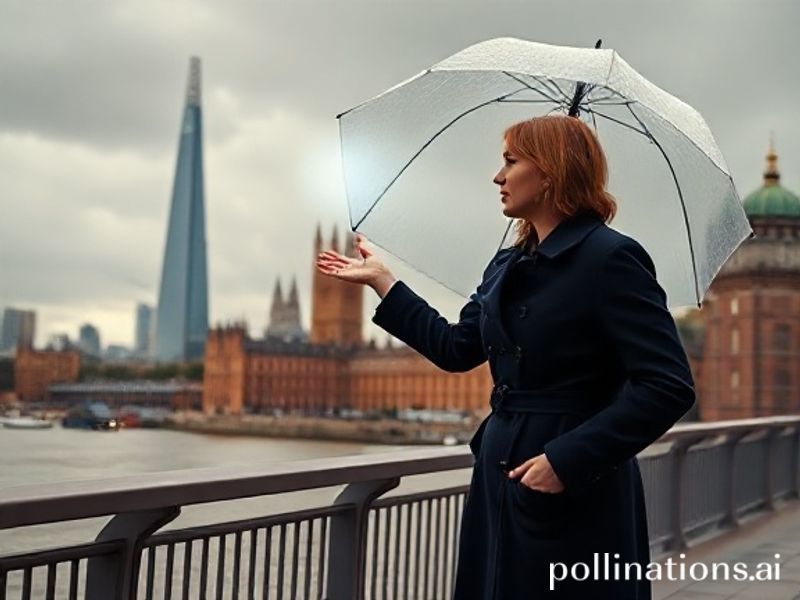BBC Weather London: How a Drizzly Forecast Quietly Rules the World
London’s Forecast: When the City’s Drizzle Becomes the Planet’s Barometer
By our correspondent in the bunker beneath the Mediocre Café, Geneva
Let us begin with the obvious: “BBC Weather London” is not merely a forecast; it is a global Rorschach test disguised as a polite green-and-yellow map. A commuter in Lagos, an oil executive in Riyadh, and a TikTok algorithm in Silicon Valley all refresh the same page, each projecting their own apocalypse onto the 14-day outlook. If London sneezes, the world adjusts its carbon credits.
The Met Office iconography—little clouds wearing expressions ranging from mild indigestion to existential dread—matters far beyond Heathrow. London’s low-pressure systems waltz into the jet stream, divorce somewhere over the North Atlantic, and remarry over the Midwest, giving Nebraska corn farmers something to curse while they insure next year’s crop against drought. Meanwhile, the Shanghai bourse trades “weather derivatives” that rise or fall on whether the Thames Barrier gets a light misting or a proper biblical soak. It is, in short, the most polite form of imperialism ever devised: the Empire now sells you the rain it used to send gunboats through.
Across the planet, embassies treat the 10-day outlook like classified cables. The Japanese ambassador has been known to forward the Saturday chart to Tokyo with the subject line “Cultural Intelligence: Carry Brolly.” The French embassy, naturally, refuses to open the link, claiming the BBC still owes them royalties for meteorology invented in 1650. And in Washington, an over-eager junior analyst at the State Department has built a regression model correlating “light drizzle in Kensington” with “probability of UK voting against us at the UN.” Spoiler: it’s 73 percent.
Yet the forecast’s real audience isn’t human at all; it’s the algorithms that now run things. High-frequency traders have servers co-located so close to the BBC’s data feed that they can short the entire British biscuit sector 0.0007 seconds after “patchy fog” appears. A millimetre of rain predicted over Primrose Hill translates, somewhere in the cloud, into a sell order on Kenyan tea futures. Somewhere an AI risk manager named Nigel.exe is quietly pleased with itself.
All of this happens while Londoners themselves maintain the noble tradition of treating weather as a spectator sport. They queue—there is always a queue—to watch the forecast on the big screen at Waterloo, applauding when a front collapses like a soufflé and sighing when the temperature fails to hit the promised 19 °C. It is communal theatre, cheaper than the West End and only slightly less fictional.
Of course, the forecast also carries darker freight. Climate scientists point out that the once-reliable procession of Atlantic depressions now behaves like a drunk leaving a pub at closing time—staggering, aggressive, prone to lurching into places that never asked for rain. Each anomalous “sunny spell in February” is logged by researchers from Mumbai to Manitoba as evidence that the planet’s mood stabilisers have worn off. The BBC presenters still smile, because that’s what the script says, but their eyes betray the knowledge that they are reading obituaries for a stable Holocene.
And so we arrive at the existential takeaway: the BBC Weather London page is the modern equivalent of the medieval cathedral door. Pilgrims from every continent gather to read what sort of judgment the heavens will hand down this week. They refresh, they screenshot, they pray to whatever deity handles cloud storage. Whether the prediction is “light showers clearing by lunchtime” or “thundery downpours with possible flooding,” the message is the same: the sky is no longer above us; it’s outsourced.
In the end, the forecast is always right, because by the time you’ve finished complaining about it, the next one has already loaded. Somewhere a server hums, a trader shorts umbrellas, and London, ever modest, continues to drizzle its way through the anthropocene. Carry a coat. Or don’t. The planet’s accountants have already priced in your decision.







